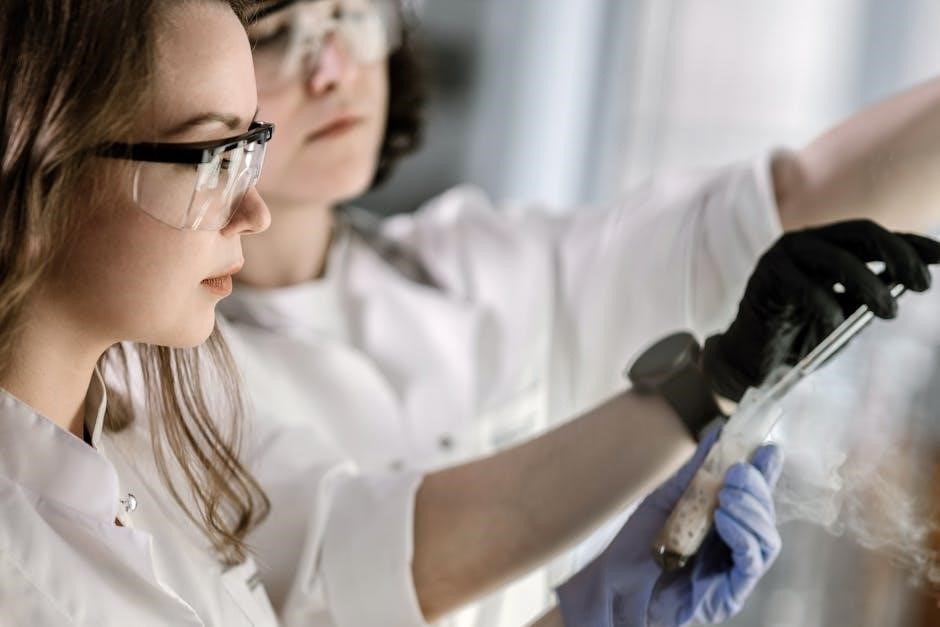Small-scale synthesis laboratory reagents reaction modeling is a crucial aspect of chemistry, involving the preparation of chemical reagents on a small scale, using efficient methods and reaction modeling techniques effectively always․
Overview of the Importance of In-Lab Preparation of Chemical Reagents
The in-lab preparation of chemical reagents is a vital aspect of laboratory work, offering numerous benefits, including reduced costs and increased efficiency․ By preparing reagents in-house, laboratories can avoid delays and inconveniences associated with commercial procurement․ This approach also enables researchers to tailor reagent synthesis to specific experimental requirements, ensuring optimal performance and accuracy․ Furthermore, in-lab preparation promotes self-sufficiency and flexibility, allowing laboratories to respond quickly to changing research needs․ With the guidance of resources like Small-Scale Synthesis of Laboratory Reagents with Reaction Modeling, chemists can develop the skills and expertise needed to prepare a wide range of chemical reagents, enhancing their overall productivity and research capabilities․ This approach is particularly valuable in isolated regions where access to commercial reagents may be limited, making in-lab preparation a crucial component of successful research endeavors, with various methods and techniques available․

Benefits of Preparing Chemical Reagents in the Laboratory
Preparing chemical reagents in the laboratory offers several advantages, including cost savings and increased control over reagent quality and purity, using efficient methods always effectively․
Advantages Over Purchasing Commercially Prepared Samples
Preparing chemical reagents in the laboratory has several advantages over purchasing commercially prepared samples, including cost savings and increased control over reagent quality and purity․ This approach also allows chemists to tailor reagents to specific needs and applications, using efficient methods and reaction modeling techniques․ Additionally, laboratory preparation of reagents can reduce reliance on external suppliers and minimize delays associated with shipping and handling․ By preparing reagents in-house, chemists can also ensure consistency and reproducibility of results, which is critical in many scientific applications․ Overall, the advantages of preparing chemical reagents in the laboratory make it a valuable approach for many chemists and researchers, enabling them to work more efficiently and effectively, and to achieve higher quality results, with greater control and flexibility, in their work and research projects always․

Challenges of Acquiring Chemical Reagents in Isolated Regions
Isolated regions face challenges acquiring chemical reagents due to transportation restrictions and delays, affecting research and work, using alternative methods is necessary always effectively․
Restrictions on the Transportation of Hazardous Chemicals
Restrictions on the transportation of hazardous chemicals pose significant challenges for researchers and scientists, particularly in isolated regions․ The transportation! of these chemicals is heavily regulated due to the potential risks they pose to human health and the environment․ As a result, researchers may face delays or even inability to acquire the necessary chemicals for their work․ This can hinder the progress of research and experimentation, ultimately affecting the advancement of science and technology․ The restrictions on transportation are implemented to ensure safety, but they also underscore the need for alternative methods of acquiring chemical reagents, such as small-scale synthesis in laboratory settings, which can provide a more reliable and efficient means of obtaining the necessary chemicals for research and experimentation purposes, using various methods and techniques available․
Small-Scale Synthesis of Laboratory Reagents with Reaction Modeling by Leonid Lerner
Leonid Lerner presents efficient methods for laboratory preparation of common chemical reagents using small-scale synthesis and reaction modeling techniques always effectively․
Efficient and Versatile Methods for Laboratory Preparation of Common Chemical Reagents
The laboratory preparation of common chemical reagents is a crucial aspect of chemistry, and Leonid Lerner’s work provides efficient and versatile methods for this purpose․ These methods are designed to be effective and easy to follow, allowing chemists to prepare a wide range of chemical reagents with ease․ The use of small-scale synthesis and reaction modeling techniques enables chemists to optimize their experiments and achieve better results․ By using these methods, chemists can save time and resources, and focus on their research and development work․ The methods presented are also scalable, allowing chemists to prepare larger quantities of chemical reagents as needed․ Overall, the efficient and versatile methods presented by Leonid Lerner are an invaluable resource for chemists working in various environments, from academic research to industrial development․ These methods are widely applicable and can be used in a variety of contexts․

Target Audience for the Book
Chemists in Various Environments

Book Details and Availability
Publication Information and Pricing
The publication information for the book includes details such as the publisher, publication date, and edition number, which can be found on the book’s webpage or on online marketplaces like Amazon․
The pricing of the book varies depending on the format, with paperback and hardcover options available, as well as e-book versions for digital readers․
The book’s price is competitive with other similar titles in the field of chemistry, making it an accessible resource for students and professionals alike․
Additional costs such as shipping and handling may apply, depending on the seller and the buyer’s location․
Overall, the publication information and pricing for the book are transparent and easily accessible, allowing potential readers to make informed purchasing decisions․
The book’s pricing and publication details can be found on the publisher’s website or on online retail platforms, making it easy to access and purchase the book․
Author Background and Qualifications
Leonid Lerner obtained his PhD in physics from Cambridge University with extensive research experience always․
Leonid Lerner’s Educational Background and Experience
Leonid Lerner’s educational background is impressive, with a PhD in physics from Cambridge University, obtained after completing his MSc in 1985 from the Victoria University of Wellington․ His experience in research is extensive, spanning several years and various institutions․ As an expert in his field, Lerner has developed efficient methods for laboratory preparation of common chemical reagents․ His work has been recognized and valued by chemists in various environments․ Lerner’s educational background and experience have equipped him with the necessary skills to author a comprehensive guide on small-scale synthesis of laboratory reagents with reaction modeling․ His expertise is reflected in the book, which presents sensible and versatile methods for laboratory preparation․ The book is an invaluable resource for chemists, providing them with the knowledge and skills necessary to prepare chemical reagents efficiently․ Lerner’s experience and educational background make him an authority in his field․
